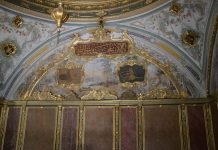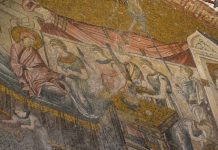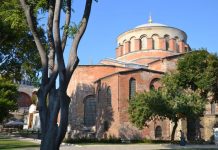At that time, too, came Count Godfrey, who had crossed the sea with the other counts and was accompanied by an army of 10,000 knights and 70,000 footsoldiers. He established his force about the Propontis, his camp extending from the bridge which was opposite Cosmidion up to St. Phocas. While the Emperor urged him to cross the strait of the Propontis, he went on from day to day contriving one excuse or another and put off the matter. The real reason, to state the matter simply, was that he was awaiting the arrival of Bohemund and the other counts.
For, though in the beginning Peter had aroused this great expedition to adore the Holy Sepulchre, the other counts, Bohemund above all, were cherishing in mind the old grudge against the Emperor and were awaiting a favorite opportunity to take vengeance on him for the splendid victory which he had gained over Bohemund when the latter engaged him in battle at Larissa. And dreaming that if they were of one mind they could take Constantinople itself, they had combined with the same thought and purpose of which we have often made mention above.
Seaport on the Black Sea.
Thus, apparently they were making an expedition to Jerusalem; in reality, however, they wanted to divest the Emperor of his kingdom and take Constantinople. But the Emperor, long since acquainted with their wiles, by letter ordered forces of Gentiles with their leaders to be stationed by squadrons from the Athyras river up to Philea, a seaport on the Black Sea. (He also ordered them) to watch in ambush for anyone sent, perchance, by Godfrey to Bohemund and the rest of the counts who were following, or by these, in turn, to him, and to deny these messengers all passage.
In the meantime, while this was going on, the following incident occurred, somewhat in this way. The Emperor had summoned before him some of the counts who had come with Godfrey, in order to urge that they consent to persuade Godfrey to carry out the promise which be had made under oath. While the time was thus being dragged out longer (than expected), for the reason that the Latin race is by nature exceedingly garrulous and wordy, there was reported to these people the false rumor that the counts had been taken into custody at the Emperor’s command.
Thereupon, the Latin legions surged together in a huge crowd and moved upon Byzantium and without delay utterly destroyed the palaces which are situated toward the swamp called Argyra. At the same time they tried the walls of the city, not with siege machines, for they were not at hand, but, trusting in their multitude, they resorted to a piece of insolence: they dared to set fire to the lower gate of the palace located near the Temple, which had been built in olden times by one of the Emperors under the invocation of Nicolaus, the greatest of the holy pontiffs.
Read More about Little Christian blood as possible should be shed








